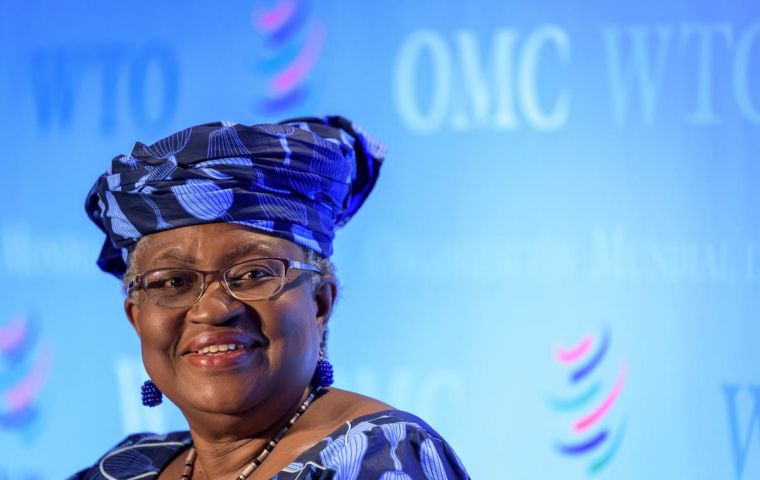MercoPress. South Atlantic News Agency
WTO speeds fisheries subsidies negotiations ahead of end of the month ministerial conference
 WTO Director-General Ngozi Okonjo-Iweala said the text represents a good balance that addresses development issues and maintains ambition.
WTO Director-General Ngozi Okonjo-Iweala said the text represents a good balance that addresses development issues and maintains ambition. The World Trade Organization chair of the fisheries subsidies negotiations, Ambassador Santiago Wills of Colombia, introduced a second revision of the draft negotiating text to be used as the basis for clause-by-clause discussions among members aimed at resolving remaining differences ahead of the 12th Ministerial Conference (MC12) to be held on 30 November to 3 December.
WTO Director-General Ngozi Okonjo-Iweala said the text represents a good balance that addresses development issues and maintains ambition.
“The revisions I am putting forward are based on all our latest collective work, with all proposals, textual suggestions and discussions informing my thinking” ambassador Wills said.
“The members' call for me to produce this kind of a revision was to put us in as good a position as possible for the clause-by-clause discussion, such that we can have a very focused discussion during the short time left before MC12.”
The revised text seeks to go in the direction of India, Bangladesh, and Sri Lanka, among other countries that want to be exempt from disciplinary actions on subsidies. The text now excludes poorer, resource-poor countries, or subsistence fishing and activity-related activities within 12 nautical miles of the coast.
Developing countries with an annual share in the volume of marine capture that does not exceed a certain volume would also be left out. The suggested limit is 0.7% of fish production, but it must be submitted to the negotiations.
For developing countries that exceed this limit, there will be a transition period to end subsidies. Some countries, like India, want 25 years to submit to the negotiated rule. Others feel that any timeframe should only be a few years.
With respect to subsidies for deep-sea and unregulated fishing, they remain subject to the ban, without exception. Subsidies dependent on or linked to fisheries in distant waters would be prohibited. These pertain mainly to fishing in the Exclusive Economic Zones of other member countries and in areas within the competence of fisheries management organizations.
WTO Director-General told members she has been engaging with political leaders, including at the highest levels, to get their support for a successful conclusion to the 21-year-long negotiations.
“The eyes of the world are really on us,” she said. “Time is short and I believe that this text reflects a very important step toward a final outcome. I really see a significant rebalancing of the provisions, including those pertaining to special and differential treatment, while, at the same time, maintaining the level of ambition.”
Members are scheduled to hold daily meetings on the basis of the latest draft text, with the goal of providing ministers a clean draft before MC12.




Top Comments
Disclaimer & comment rulesCommenting for this story is now closed.
If you have a Facebook account, become a fan and comment on our Facebook Page!